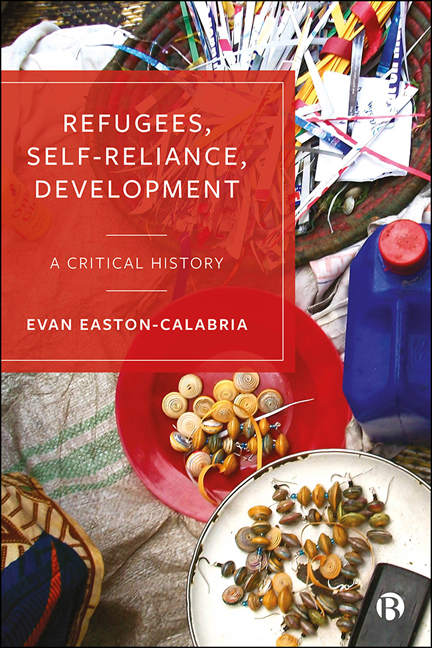Book contents
- Frontmatter
- Dedication
- Contents
- List of Figures and Tables
- Abbreviations and Acronyms
- Notes on the Author
- Acknowledgements
- 1 Introduction: Why Refugee Self-Reliance?
- 2 Self-Sufficiency out of Necessity: Refugee Self-Reliance Assistance in Interwar Greece
- 3 Socialism and Self-Reliance: Refugee Self-Reliance Assistance in Post-Colonial East Africa
- 4 Warriors of Self-Reliance: Refugee Self-Reliance Assistance in Cold War Pakistan
- 5 Dignity in Informality? Urban Refugee Self-Reliance Assistance in Kampala, Uganda
- 6 Livelihoods 2.0? Refugee Self-Reliance and the Digital Gig Economy
- 7 Conclusion
- Annex: A Note on Methods and Sources
- References
- Index
- Frontmatter
- Dedication
- Contents
- List of Figures and Tables
- Abbreviations and Acronyms
- Notes on the Author
- Acknowledgements
- 1 Introduction: Why Refugee Self-Reliance?
- 2 Self-Sufficiency out of Necessity: Refugee Self-Reliance Assistance in Interwar Greece
- 3 Socialism and Self-Reliance: Refugee Self-Reliance Assistance in Post-Colonial East Africa
- 4 Warriors of Self-Reliance: Refugee Self-Reliance Assistance in Cold War Pakistan
- 5 Dignity in Informality? Urban Refugee Self-Reliance Assistance in Kampala, Uganda
- 6 Livelihoods 2.0? Refugee Self-Reliance and the Digital Gig Economy
- 7 Conclusion
- Annex: A Note on Methods and Sources
- References
- Index
Summary
After a century of humanitarian and development practice, the concept of refugee self-reliance endures. And the question remains: What do we mean when we speak of refugee self-reliance? And who is speaking – or should be – about it, anyway? Past chapters of this book explored specific practices intended to foster refugee self-reliance, its constructed ‘beneficiaries’ (such as vulnerable refugees or refugee entrepreneurs), and how refugee self-reliance assistance has evolved in parallel with broader trends in global economic and political history. This history reveals selfreliance assistance as not only an inherently contested but a constricted concept, as seen by outside actors such as the donors, humanitarians, and states imposing programmes on refugees as subjects, be they considered beneficiaries, entrepreneurs, or livelihoods training participants.
The implications of many findings from the history of refugee selfreliance assistance are moral, practical, and problematic: this assistance purports to offer refugees the ability to enact their own agency – a situation many would agree is inherently in conflict – and in doing so reveals relationships of power and instrumentalization. This history has demonstrated both continuity and change in the conceptualization and practices of refugee self-reliance by dominant actors – and a century of disappointing outcomes in the institutional fostering of refugee self-reliance by many of the very actors purporting today to uphold refugees’ dignity and enhance their protection.
Theoretical contributions to the study of refugee self-reliance
This book's critical reading of history illuminates the role of capital in shaping refugee self-reliance policy, and treats refugee self-reliance assistance itself as a shifting set of practices intimately connected to the capitalist system. In so doing, several particularly valuable elements of critical theory for the study of refugee self-reliance emerge: first, an examination of structural causes of a given phenomenon using the logic of the capitalist system – with the intent then, as Schuurman states, ‘to do something about it’. This element helps us ask everything from why particular humanitarian and development programmes are structured the way they are, with a given set of objectives, to what structural economic forces are impacting the actual outcomes of such programmes.
- Type
- Chapter
- Information
- Refugees, Self-reliance, DevelopmentA Critical History, pp. 193 - 205Publisher: Bristol University PressPrint publication year: 2022

